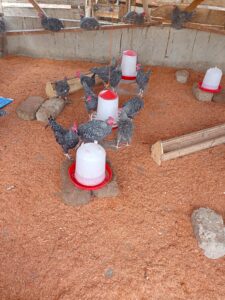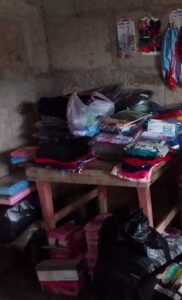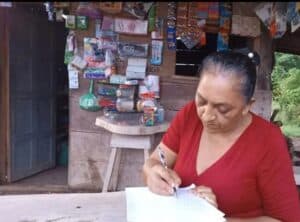
Sarah rises to the challenge to confront COVID-19
This originally appeared in the Bremer County Independent on May 26, 2020. Reposted here with permission from the editor. View a scan of the print version here.

Sarah Barnie.
By Nora Tobin, Self-Help International Executive Director
By March 15, Ghana had six confirmed cases of COVID-19. That evening, the President Nana Akufo-Addo addressed the nation about a series of measures related to preventing the spread of COVID-19. Two weeks later, as more cases were spread by community transmission, the President again addressed the nation to announce a lockdown to stop the spread.
There were so many unknowns. Sarah Barnie had spent the last fifteen years building her business in the village of Nerebehi outside of Kumasi, one of the areas affected by the lockdown. She had come so far from the time that she accessed her first loan from Self-Help International and started sewing clothing to sell. She’d used subsequent loans to purchase a newer sewing machine and to expand her sewing shop. As she mastered the craft, she began hiring aspiring seamstresses and tailors as apprentices and taught them the trade from her shop. As business grew, she secured electricity for her shop and added electric sewing machines to her fleet alongside the treadle machines.
Over time, Sarah was able to achieve financial independence. She is highly regarded in her community. She takes pride in having been able to support both of her daughters to follow in her footsteps toward self reliance. The younger daughter is now a fully qualified hairdresser and a small business owner as well, operating a well-equipped salon.
As one of the most enterprising women Self-Help had worked with, Sarah and one of her apprentices were invited to a special training session for highly skilled seamstresses to learn how to make reusable Days for Girls menstrual hygiene kits in February 2017. She’d recently completed a follow up training course and has been filling new orders, and even built a new store to diversify into grocery sales as well.
But what would this global pandemic and lockdown mean for her? For her family? For her business? For her daughter’s business? For her apprentices? For her community?

Sarah’s shop and the apprentices that work for her (taken in January 2020 before the pandemic).
Her life had not been without challenges. Sarah had overcome adversity, large and small. Many times. She had practiced resilience.
Her elder daughter, in whom she had so much confidence, had completed high school and was about to join the Ghana Police Service when disaster struck and she died at just 21 years old. Sarah was shattered. Yet somehow, in spite of the crippling grief, she found a way to move forward.
She had seen her community recover from tragedy as well. In 2012, her village had experienced an unusual power surge, which killed some of her neighbors, burnt houses, and affected every person, family and business in the community. They rose up from that devastation.
And her own business was not without risks. Sometimes she would take orders from clients, she would sew the commissioned pieces, and never see them again, and never get payment. That too she overcame.
But even after all she had overcome before, could her family, her businesses, her community survive this global pandemic?
Among so many unknowns, one thing was clear: this was a time of market disruption. Self-Help’s micro-credit program officers reached out to Sarah to see how she was doing. They discussed precautions she could take in her household and in her business to reduce chances of being infected or spreading COVID-19.
Small business owners like Sarah would need to adapt to find ways to sustain their livelihoods while effectively social distancing. They asked Sarah how her business was faring and discussed how the market was likely to change and what new factors to consider in determining what would be best for her business. They talked about trends, and the risks and rewards of adapting your business model ahead of or after arrival of a trend. Handmade masks were likely to be in demand in the weeks and months ahead, perhaps briefly, perhaps for a sustained period of time, perhaps not at all.
As a seamstress, Sarah was well-suited to begin making and selling masks for her neighbors. She could be part of the solution to helping support the health and hygiene of her community. What factors would she need to weigh in deciding whether and when to add masks to her business?

Face masks by Sarah.
Use of washable fabric masks was still a bit of a gray area. The World Health Organization guidance referred only to the use of disposable masks, and the Ghana Health Service did not have a policy on the use of reusable masks at the time. It was unclear how recommendations would evolve over time. It was possible that when properly used, handmade masks could keep people safer. When sewing Days for Girls kits, Sarah incorporated an element of education to ensure her clients could properly use the kit that went beyond simply sewing the materials together properly and selling the kit. What could that education component look like for how to properly use a mask?
In early April, the CDC began recommending wearing cloth face coverings in public settings where other social distancing measures are difficult to maintain (e.g., grocery stores and pharmacies) especially in areas of significant community-based transmission. Sarah observed medical personnel on TV wearing masks and decided that she would begin making masks for sale.
She created three designs for face masks and began sewing them in anticipation of future orders. She thought that Ghana Health Service was providing good education on the basic dos and don’ts of face mask usage, and decided she could also play a role in providing some basic education about how to put the masks on safely.
Then on April 19, President Akufo-Addo addressed the nation again. He announced the easing of restrictions. And he encouraged all citizens to wear face masks in public.
Sarah was already prepared. Orders for reusable masks were pouring in, including from Self-Help Country Director Benjamin Kusi, who placed an order for 30 masks to distribute to staff members. Sarah was ready to rise to the challenge.
But when Kusi arrived at her shop in Nerebehi, Ghana on Saturday to collect the masks, she refused payment. “She was rather full of gratitude to SHI,” Kusi reported. Sarah donated the face masks to SHI staff instead, along with a piece of fabric and patterns to train members of the teen girls clubs that Self-Help supports to produce and sell face masks.
The idea to sew masks has helped her prepare for the sudden influx in demand. She could ensure that her neighbors and friends would be able to access the masks they need to go out in public now that the lockdown restrictions have been eased. “Sarah says a big thank you to SHI.”
Self-Help regularly shares accurate, reliable information to help our clients make informed decisions about what is best for their households, their businesses, and their communities. This knowledge to make informed decisions empowers our clients with greater agency and combats feelings of helplessness and vulnerability. With COVID-19 causing disruptions to daily life worldwide, access to reliable information is important now more than ever. Help us rise to the challenge as we continue to support more than 500 more small business owners like Sarah adapt their businesses and meet their families’ and communities’ needs in the months ahead.

 Previous Post
Previous Post Next Post
Next Post


